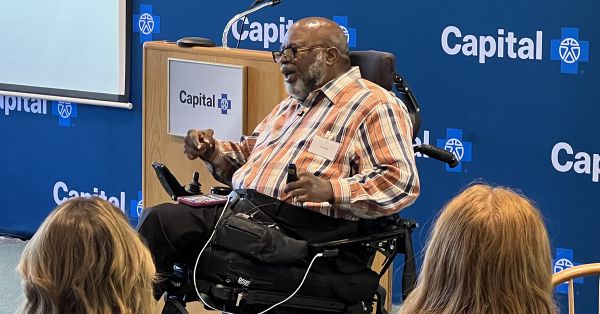More people with disabilities are getting hired, and that benefits everyone in the workplace. But most of all, says a nationally known advocate, employees with disabilities bring unique skill sets and perspectives that benefit productivity – and the bottom line.
An untapped resource.
That’s how Theo Braddy describes the undersized role people with disabilities play in the United States workplace.
“To navigate through a world that was not built for you calls for a lot of creativity, a lot of resources, and a lot of spontaneity and ingenuity,” Braddy said after a recent discussion with Capital Blue Cross employees. “And aren’t those things that any employer wants?”
Braddy would know. Disabled since suffering an injury playing football at age 15, he’s spent his adult life navigating that “world that was not built for” him and has become one of the country’s most celebrated champions for the disabled.
Braddy’s visit to Capital Blue Cross – hosted by Capital’s Ability Beyond Disability Employee Resource Group (ERG) – focused on the varied benefits those with disabilities bring to employers.
His impassioned points made perfect sense to Patti Karper, Capital Blue Cross vice president of Health Plan Operations and the executive sponsor of the Ability Beyond Disability ERG.
“Individuals with disabilities make great employees, and we focus on hiring talented people based on their capabilities,” Karper said. “We see beyond the disability, which is also why we named our ERG ‘Ability Beyond Disability.’ ”

Progress Steady, If Slow
Braddy and other advocates have made headway when it comes to hiring people with disabilities. According to the U.S. Bureau of Labor Statistics, 21% of people in the U.S. with a disability were employed in 2022 – the highest rate since tracking began in 2008.
“When you hire people with disabilities, you are hiring reliable, dependable people,” Braddy said. “Employees with disabilities come in earlier and stay longer. That’s been proved over and over again. There have been studies on it, and the reveal is that people with disabilities just make great employees.”
Braddy has made similar points for decades in various high-ranking advocacy posts in Pennsylvania, where he was CEO of the Center for Independent Living of Central Pennsylvania, commissioner for the Pennsylvania Human Relations Commission, and a member of the Statewide Independent Living Council and State Board of Vocational Rehabilitation.
Recently, Braddy’s expertise elevated him to national roles. In September 2022, President Biden appointed him to the National Council on Disability, and in early 2023, he became executive director of the National Council on Independent Living.
Steps Toward Inclusion
Braddy advises employers to actively include those with disabilities by:
- Making inclusion training a priority.
- Supporting local and national disability groups or other marginalized groups by sponsoring and volunteering.
- Attending diversity-focused conferences.
- Most importantly, interacting with people with disabilities. “Talk with them,” Braddy said, “not about their disabilities, but about everyday life.”
- Following Capital Blue Cross’ lead and form an ERG for employees, families, friends, and allies of those with disabilities.
“You can have great DEIA (Diversity, Equity, Inclusion, and Access) policies,” Braddy said, “but those are just words on a website if you don’t take steps (to bring the words to life).”
The bottom line is that employees with disabilities are good for – well, the bottom line, Braddy said.
“They stick to projects and bring a creativity that comes from their lived experience,” he said. “They make their co-employees more productive because they learn from each other, so become less narrow-minded.
“We (people with disabilities) successfully deal with adversity every single day. To have that at the table (in the workplace), an on-tap resource that people don’t really take advantage of, it makes sense.”
THINK (Trusted Health Information, News, and Knowledge) is a community publication of Capital Blue Cross. Our mission is to provide education, resources, and news on the latest health and insurance issues.




